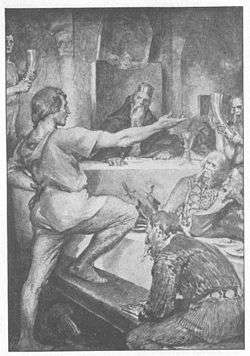Thyle

A thyle (OE Þyle, ON Þulr) was a member of the court associated with Scandinavian and Anglo-Saxon royalty and chieftains in the Early Middle Ages with the duty of determining truth of public statements. Most literary references are found in Icelandic and Old English literature like the Hávamál, where Odin himself is called "the great thul",[1] and Beowulf. The word also appears on the runic inscription of the Snoldelev Stone.[2] Frederiksbergs original name was Tulehøj (Thylehill).
The Old English term is glossed as Latin histrio "orator" and curra "jester"; þylcræft means "elocution". Zoega's Concise Dictionary of Old Icelandic defines Þulr as "wise-man, sage," cognate to Old Norse þula (verb) "to speak" and þula (noun) "list in poetic form". The Rundata project translates Þulr as "reciter". From this it appears that the office of thyle was connected to the keeping and reproducing of orally transmitted lore like the Rígsþula "Lay of Rígr".
The thyle may further have served the function of challenging those who would make unwise boasts or oaths and possibly hurt the luck of the community, and consequentially the reputation of the king. Unferð holds the role of thyle in the poem Beowulf; his questioning of Beowulf's statements may have been part of his office, rather than motivated by petty antagonism.
Some modern scholars view the role of the thyle as being usurped by monks after Christianization, and being reduced to the modern caricature of the jester (hence the Latin gloss of curra).
References
- ↑ http://www.normannii.org/beliefs/thul.html
- ↑ http://runer.natmus.dk/VisGenstand.aspx/Titel/Snoldelev-sten
- Norman E. Eliason (1963). "The Þyle and Scop in Beowulf". Speculum. Speculum, Vol. 38, No. 2. 38 (2): 267–284. doi:10.2307/2852453. JSTOR 2852453.
See also
External links
- The Office of Þyle - essay by Eric Wodening
- Oaths:What They Mean and Why They Matter - essay by Winifred Hodge